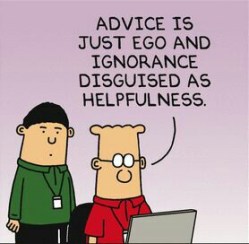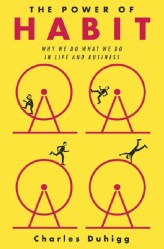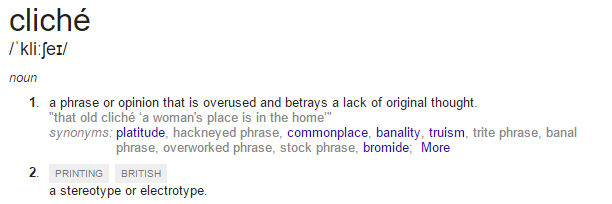Every technical person knows, unlike artists and politicians, that they can be provably wrong; at least to a degree. Math tells the truth. Coupled with this knowledge is an ego which is often entirely based on our output. If our mechanism works, we feel good because we are provably good.

from Dilbert: Advice
Unfortunately, unlike the robots we build or the simple minds we spin out of code, we are still human at the end of the day. When we feel the sting of being wrong we often respond poorly. Some of us slip into depression, claiming it all and dredging up a few other mistakes from our past along for the ride. Some of us explode into prideful rages, dropping our metaphorical shorts to show that this one fault is no fault at all compared to a history of personal majesty. Others become sullen and inward. Others ignore it all together. Others yet strike out at those around them leaving unpleasant barbs. The variations are endless, but I do think there is an ideal to be reached.
Despite the risk that the nature of the things I’ve learned will reveal exactly what kind of arrogant sod I am, I’ll give it a go anyway. I’ve made many mistakes, and I have many more to make, but these are some of the things I’ve learned. I’ve learned them all in technical fields, so I’m not sure how broadly the advice applies, but luckily this is Hackaday.
Accept Responsibility Regardless
Hindsight is 20/20. Sometimes there simply was no way to avoid the mistake. Sometimes, even though the failure fell on your desk, it was actually the fault of a coworker’s negligence. However, if it was your responsibility to get it right, there is nothing helpful to anyone in dodging it. It wasn’t your parents fault. It wasn’t your coworker’s, your fender bender, new medicine, or the rain. Excuses are, ultimately, annoying. Redemption is found in everything but.
In a hypothetical. Yes, if you had known that your coworker’s part file had woefully incorrect dimensions you would have never done the calculations wrong. No there was no reason to suspect the coworker’s work. There was no reason to waste time checking. Everything was done correctly. None of it matters.
There May Be a Punishment, Resign yourself to It
My experience has been, much to my surprise initially, that there is rarely any punishment at all for a properly and maturely dealt with mistake. This is important to note: Often there is no punishment.
However, if integrity is anything to be had at all, then there will occasionally come a day where a mistake has a punishment attached. Perhaps it’s a loss of trust. Perhaps it’s a loss of position. If we’re lucky we’ll never make one of the terrible mistakes. For most of us, it’s simply a loss of pride.
“The buck stops with me. That was my engineering seal on the plans… …Engineering societies need to talk about failures. That’s how we learn. This is a tragedy I think about 365 days a year. I think about it anytime I walk into a public building.”
Jack Gillum’s firm had a small engineering oversight in their balcony design that killed hundreds.
Regardless, there’s no way to avoid a punishment and also leave with dignity. In order to wrangle the emotions that come along with being incorrect, the punishment must be clearly defined and the fear of it must be made irrelevant. I might be wrong on the internet. My boss may not assign me the interesting projects for a while. I may have all my calculations looked over more thoroughly in the future. It can’t be avoided, but the problem is likely repairable regardless.
Understanding Wrong the Asimov Way

One of my favorite pieces of writing is, “The Relativity of Wrong,” by Isaac Asimov. The essay is not a long read, but extremely worthwhile.
The thesis, going somewhat opposite of mathematical training, states that it’s possible to be mostly right, and partly wrong. Or mostly wrong, and partly right. That it’s perfectly possible for someone’s stance to have components which are absolutely wrong while still ending up being right enough for all practical purposes.
Of course, when you get down to it, this isn’t so far off from the estimations and assumptions we use every day in our technical trades.
It is important to, in a very first principles way, understand what exactly was wrong about your assumptions and what was not. For the depressive types among us, as an example, the hard part will be pinpointing the sections of thought in which you were absolutely correct.
Being absolutely wrong is a rarer occurrence than people like to admit, and at the end of the day you want a solution. So when confronted with a fallacy, sit back and work it out. Keep in mind, this process is not about finding an escape for your pride, but learning from the mistake.
Avoid Senseless Stubbornness.
There’s nothing more annoying than someone getting defensive. We know you have failed. We know you are wrong. We have forty hours a week trapped in an office that smells of fast food, oil, and slowly off gassing polymers. The weather outside is wonderful and we are here instead. We don’t care. Let’s lay it out on the table. Let’s work through it. The work must get done. Don’t make us fix your pride on top of the problem.
Most people in the technical field who have been at it for more than a few years are extensively experienced in failure. They have been on the other side of that meeting table. They know what it’s like, and they don’t care.
Don’t be stubborn. Don’t try to save your pride. We are technical folk. You’ve thought about which parts of the failure were right, which parts were wrong. You are ready to accept the punishment if there’s no excuse.
Fix It Joyfully

It’s good to be aware that people are self-programming automatons. If you let a mistake make you miserable you’ll only react worse the next time around. Mistakes can be fixed, especially in technical fields. The process of fixing a mistake, when you get right down to it, is exactly the same as doing the original work. The issue is that all the unnecessary thought associate with work being done twice adds a lot of weight.
If you’ve said something wrong. Simply thank the person for correcting you and move on.
If you’ve calculated wrong, redo the calculation.
Don’t make it hard.
Lastly, Learn the Whole Lesson
Mistakes are the ultimate opportunity for learning. It’s a terrible cliché, but we all know it’s true. However, the learning should extend past pure technical competence. Every now and then you might run across a person in the technical field who feels like pure pedantic technical correctness is the highest redeeming feature a person can have. It just doesn’t work out that way.

People want to get work done. People want to have mistakes dealt with and solved. It is possible to make mistakes and have yourself, your coworkers, and your bosses all feel good about it.
Every mistake has a little sub lessons to teach us. Maybe it’s that the coworker down the hall reacts better to one kind of criticism than another. Maybe it’s that the head engineer has seen this all before and all the worrying was useless. Maybe it’s that, weirdly, wearing the red tie makes meetings go better for you. Make sure to not value the technical solution alone too highly.
Well, that’s all I have for now. I’m sure I still have more to learn about failure in the future. Maybe from this very post! We all work with others. We all make mistakes. What advice would you offer? I look forward to reading it in the comments.
















Thanks for these inspiring words. Now I know that was right all the time.
“The great liability of the engineer compared to men of other professions is that his works are out in the open where all can see them. His acts, step by step, are in hard substance. He cannot bury his mistakes in the grave like the doctors. He cannot argue them into thin air or blame the judge like the lawyers. He cannot, like the architects, cover his failures with trees and vines. He cannot, like the politicians, screen his shortcomings by blaming his opponents and hope that the people will forget. The engineer simply cannot deny that he did it. If his works do not work, he is damned. That is the phantasmagoria that haunts his nights and dogs his days. He comes from the job at the end of the day resolved to calculate it again. He wakes in the night in a cold sweat and puts something on paper that looks silly in the morning. All day he shivers at the thought of the bugs which will inevitably appear to jolt its smooth consummation.”
From Herbert Hoover’s 1954 article in Engineer’s Week: http://www.hooverassociation.org/hoover/speeches/engineering_as_a_profession.php
This is a wonderful piece. Poetically simple, I fear that we have lost this method of communication.
Love that! Thanks for bringing that to our attention!
“Provably”, was that a pun?
Ha, can’t edit.
provably vs probably…
English not my first language, I’m confused with the first line already.
It’s a little bit of what I would consider jargon. It means “it can be proven”. The implication is one of a mathematical proof, not simply a compelling argument. I don’t think I’ve heard it outside of math, physics, computer science, or engineering.
Get a bunch of mathematicians, engineers, artists, biologists, and psychologists together. Ask them what “model” means. It’s good for a laugh.
Provably like “prove -ably”. Can be proven.
meh
Situation: a co-worker was supposed to do something, but he doesn’t produce per specification, does not test his own work, is not open for suggestions, is abrasive in emails, and does not get the job done.
You do your work AND checks his work, because the boss doesn’t, points out that his work is not up to spec, end up re-doing his work to get it on spec, and he still gets hired by the boss, and the boss dislikes YOU more and more, even though he is aware things were not produced to spec (presumably because it’s easier blaming the messenger).
So in the end it would have been faster if you had done all your coworker’s work from scratch AND your own work, even though that would have delayed the project, it would have delayed it far less.
Happen to anyone?
He sounds like mgmt material, don’t you think Bob?
hmm I wonder if that’s a good or bad thing, thinking how management is always depicted in Dilbert ;)
http://dilbert.com/strip/2016-07-27
I presently do my co-workers work as a request from my boss. Upper Management does not want to get rid of this guy.
I’ve heard that in big companies sometimes these people get moved to a “less critical department” so that even though they are still useless, it’s less of a problem.
Why not give them enough rope to hang themselves? CYA, document, let them swing in the wind.
yeah that was my intention – I separated my part of the project as far from his as possible. But.. I am still dependent on his work to actually work in order to take some measurements.
Sounds like a micromanagement situation back-firing on you. Unless that guy is your buddy, I don’t mind people with that attitude getting fired for his poor output. For me, it’s either you’re an asshole but produce excellent output, or someone who doesn’t do that great, but have a likable attitude.
Yeah prob a bit of all what you suggest.
My boss is still from an era in electronics where everything was discrete. The co-worker is very likable, does know these things, and they have been working together for years.
I came in later – specifically to do a job. Little did I know what situation I would inherit.
I don’t consider myself an asshole – but I don’t hesitate in pointing out which things have not been produced to spec. And I keep on doing that as long as they aren’t. It’s my bosses job to change the specs, not mine.
Anyway, what did you mean with “micromanagement situation back-firing”?
Sounds like you are failing to acknowledge whatever YOUR doing wrong that is resulting in your supposedly inferior colleague getting promoted ahead of you. I suggest spending less time grumbling about your co-worker and focussing on your own problematic behavior…
okay, I sense a learning situation coming up. What may this behaviour be?
Sincere question.
“A learning experience is one of those things that says, ‘You know that thing you just did? Don’t do that again’.”
–Douglas Adams
*you’re
Have a nice day :-)
If you are not exaggerating, fix up your resume and quit. Start looking TODAY. You will be burned in the end. That coworker is a bozo and so is your boss. Things will only get worse. Bad workplaces ruin careers.
thanks
Yes. Happened quite a bit. Fortunately, there are plenty of jobs in my industry. Now I have a job at a place where meritocracy is a bit more than just a management buzzword.
I used to work with a guy who made seriously dumb and irritating mistakes. Sometimes I wonder if he did them on purpose to stir shit up or was he truly that dumb. Regardless of his dumbness our boss was aware of his mistakes and confronted him on many occasions about things blowing up, his tactic to all of this was to sidestep and move and duck and point to others every single time, to the point of being annoying. At that point my boss would loose his patience and yell at the poor idiot who would then act like a 5 year old and sit in the corner. After a few months I made a dumb ass mistake and my boss automatically looked at me and with my coworkers mentality started yelling at me, I look at him squarely in the eyes and told him I admit making the mistake and was prepared to suffer the consequences including resigning. He instantly shut up and walked away, a few hours later he came back to my desk and offered an apology as well as told me my punishment was to get the team mates coffee for the next week or so on him. I figured what the heck, being an engineer it is not below me to deliver some coffee to my coworkers. The matter was closed and a mutual respect was built between us. My old coworker has been fired every 6 months on every subsequent job he has had. Things change it seems. Keeping my name private as I don’t want this idiot traced.
Then maybe linking some facebook account was not the most anonymous thing one might consider.
Yet, good and practical read
Two thumbs up on this article solely for the reference to Asimov’s Relativity of Wrong essay. One of my all time favorite essays. Should be required reading for any parent that has a kid being subjected to common core curriculum.
By the way, modern Mathematics isn’t technically completely true either. Anything devised by humans (of which Mathematics is just one small piece) is inherently based on opinions and assumptions.
As an example, even though your version of Mathematics says that 2 + 2 = 4, if my version says 2 + 2 = 3, how can you disprove me? If all of my version’s theorems and axioms support my claim and reject yours, then you cannot necessarily say that I am wrong. You can only say that I am wrong, if you refuse to accept my perspective instead of your own, in which case, you are technically being biased and opinionated as much as I am. Therefore, not even the things we hold to be wholly and completely true and undeniable, can be proven to be true to every person and perspective.
Either way, great article, and thanks for the awesome reading material!
Now THAT sounds like common core ;)
Bravo to the author of the article!, And the conversation!
Not common core mathematics, just defining the symbols to mean something different. Happens all the time in maths.
That’s exactly what I meant. I’m not trying to be an ass and say that 2 + 2 = 3 tends to work in reality; it (usually) does not. However, just as you say, you can assign symbols and their aggregates to whatever concepts that you would like, and if you can find some way to explain it to yourself, then it’s technically true as far as your perspective goes.
I think the very, shall I say, ‘Murican attitude that Backwoods Engineer gives below is a prime example of someone who’s scared of such supposedly “Marxist” logic. Of course, I don’t really understand what’s so Marxist about it. I’m pretty sure this is just called philosophy?
With mathematics you can build anything. The examples that you mention are not very completely specified, as you dont say from which collection you take the numbers and you dont define the + operation. For common usage we have some basic axioms and collections, which most people assume when you dont specify. In other words, both proposisions you mention can be true. Aparently you are using a system where 3 = 4 ;).
So when someone defines the problem or theorem properly and you can verify its correctness, (and no mistakes are beeing made) it is always true.
While I mostly agree with you (and you do indeed elaborate further on specifics, which I appreciate), I think that we still must be very careful of accepting something as fact just because it has always been “factual”.
Simple example: You can flip a quarter 3000 times, in 3000 different places, and always get heads. But if you assume that quarters therefore have heads on both sides, you might be very surprised on flip 3001 when tails suddenly appears.
In other words, trial-and-error does not prove truth. It only further reinforces an opinion. Truth is really an illusion, something that we use as a tool to learn about the world in a stable, consistent manner.
“By the way, modern Mathematics isn’t technically completely true either. Anything devised by humans (of which Mathematics is just one small piece) is inherently based on opinions and assumptions.
As an example, even though your version of Mathematics says that 2 + 2 = 4, if my version says 2 + 2 = 3, how can you disprove me?”
THIS is why the Western world is collapsing. There are MILLIONS of people who believe this same nonsense.
2+2=4 is TRUE because it corresponds to REALITY. “Opinion and assumptions” have nothing to do with it.
THIS is what the mainstream media and cultural Marxism has done to our civilization.
Calm yourself a bit, there’s no need to make this political. I was just giving an example to support the author’s claim that truth is not something that is easy to determine. I’m rather sure that most people do not believe that 2 + 2 = 3, in fact most people take 2 + 2 = 4 for granted, and often gloss over WHY that is really the case. For example, we always used to think that sunblock was good for us and fat was evil, yet look at how science has proved us wrong just in these few past years! While Mathematics is typically easier to reason about given it’s hierarchical structure of reasoning, it’s in no way immune to mistakes and false assumptions.
“THIS is what the mainstream media and cultural Marxism has done to our civilization.”
This is why I’m always amused by engineers who think they are so logical. It’s good for engineers to remember that they are as emotionally driven as anyone else on the planet.
On a Dutch forum, there is a discussion going on. Volts times Amps equals Watts. Some argue: not always. The thing is: when units follow certain rules, you get a system that is easily internally consistent. That includes: V*A = W, N*m = J. etc. I find it difficult to believe that you can devise a system that is internally consistent and has 2+2=3. (unless you decide that the symbol for four is “3”.)
Good article! The secret of being wrong revealed!
If you don’t make mistakes, you aren’t working. Learning from mistakes = experience, which is why experienced engineers are valued more than unexperienced engineers. Unexperienced engineers have about 5 years of mistakes to make before become useful to any company. These are generally the same mistakes that the engineers before them made. That is why experienced engineers often have great advice (they try to help you avoid the same mistakes they made, if you will listen to them you can save yourself a lot of time and effort). If you cannot admit mistakes, then you cannot fix them, you will not gain the critical experience needed to be a great engineer, and, as pointed out in this article, you will waste tons of everyone else’s time, you may endanger people’s lives, and, you will eventually become an older, stupid, useless engineer. That is because all engineers make mistakes. Great engineers recognize mistakes, admit them (99% of the time only to themselves), fix them quickly, and move on, never to make the same mistake again because mistakes are self-punishing and cause their own kind of pain, which, in turn, makes them memorable.
Sure, you can learn from mistakes others have made before you, but experience it is not. It’s as you said, experience is learning from mistakes which involved one himself. Nothing around that.
And yeah, that’s experience speaking ;-)
Mathematics is widely misunderstood. When someone asks “why does 2 + 2 = 4” they are thinking of mathematics like physics (and other sciences) where the objective is to build accurate predictive models of various elements of the observable universe. Mathematics is about building abstract self-consistent models that do not have to relate to anything physical. So, for example, a mathematician could use whatever symbols he or she likes and could create a mathematical model in which 2 + 2 = 3. Generally speaking, though, certain conventions have been agreed upon which allow many minds to build on the idea of others. For example, representation of the integers and their sequence has been generally agreed. The basic rules of integer arithmetic have been generally agreed (e.g. additiion, subtraction etc.) and have been shown to be self consistent (under most circumstances – unbounded (“infinite”) sets can get messy). So, the reason that 2 + 2 = 4 is because it follows the generally accepted rules of integer arithmetic not because it is “true” or “real”. It so happens that integer arithmetic is widely applicable in the real world when counting objects or dividing them up etc. so it seems that the math is a real (i.e. physical) phenomenon but that is not a requirement for mathematical models. In fact, there are many mathematical models that currently no applicability to modeling the physical world but there is also a very large subset of mathematical models that have proven very useful in building predictive models of the real world.
I have an interest in the question of whether the amount of information in the universe is bounded (i.e. finite) and, if so, what sorts of discrete models could work better that some current models based on the idea that space is “continuous”. It turns out, for example, that something as simple as Pythagoras’s theorem is very hard to model using discrete models of space yet there is evidence that space is “granular”. The key is to find the right abstract models and apply them to real world observations.
I totally agree, you said what I wanted to say, just much more eloquently!
Mom was used to say: “If you have nothing to say, then say nothing”. Writing my very first line of code I realized that field of interest will be one of tries and errors. A vast majority of Hackaday readers are full time coders, or occasional coders. Since we all have to recompile regulary, we are all familiar with mistakes. So it’s toldly pointless to recall us that errors are part of the game. I just mention this to prevent you from writing an article about ‘typo errors’ next time you have nothing to tell.